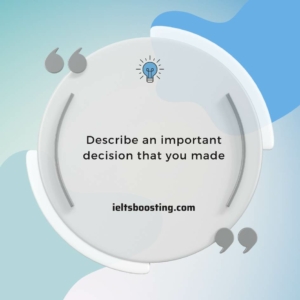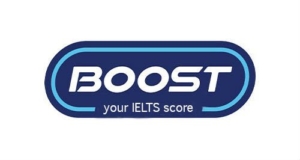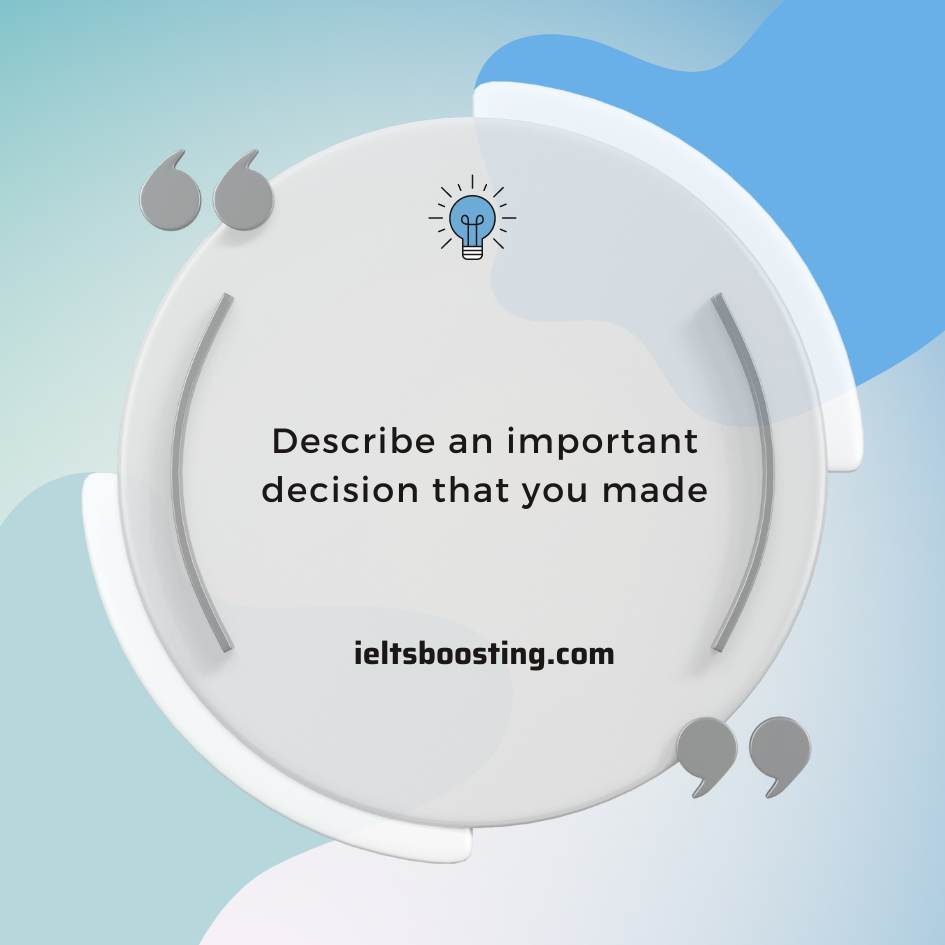Describe an important decision that you made
You should say:
● What the decision was
● How you made your decision
● What the results of the decision were
● And explain why it was important
Explore more: ielts speaking part 2

Describe an important decision that you made
Part 3-Describe an important decision that you made
Do you think children sometimes have to make important decisions?
Yes, children do sometimes have to make important decisions, even at a young age. These can range from choosing their academic subjects or extracurricular activities, which can shape their interests and future paths. It’s essential for them to learn decision-making skills early on, as it helps build their independence and critical thinking abilities.
Advanced Vocabulary:
- Critical thinking abilities: The capacity to analyze facts, generate and organize ideas, defend opinions, make comparisons, draw inferences, evaluate arguments and solve problems.
- Independence: Self-reliance and the ability to make decisions without undue influence from others.
Verb:
- Shape their interests: To influence or determine the things they are interested in or passionate about.
What important decisions do teenagers need to make after graduation?
After graduation, teenagers are at a major crossroads where they need to decide whether to continue their education or jump straight into the workforce. For those choosing further education, picking the right major and college is crucial, as it shapes their academic and professional trajectory. Meanwhile, those opting for work must consider what type of job aligns best with their skills and interests, setting the stage for their early career development.
Advanced Vocabulary:
- Professional trajectory: The direction or path of a person’s career growth and development.
- Career development: The process of managing life, learning, and work over the lifespan.
Phrase Verb:
- Jump straight into: To immediately start or engage in something, often without prior experience.
Who can children turn to for help when making a decision?
When children need help making a decision, they often turn to their parents or guardians first, as they typically offer guidance based on experience and understanding of their child’s needs. Teachers and school counselors are also valuable resources, providing professional insights and advice, especially regarding educational and social matters. Additionally, children may seek opinions from friends or peers, who can offer a different perspective and share their own experiences in similar situations.
Advanced Vocabulary:
- Professional insights: Expert opinions or understanding gained through training and experience.
- Different perspective: A way of viewing things that is different from one’s own.
Phrase Verb:
- Turn to: To go to someone for help, advice, or information.
Do you think advertisements can influence our decisions when shopping?
Absolutely, advertisements can have a big impact on our shopping decisions. They’re designed to catch our eye and often highlight the most enticing aspects of products, making them seem more appealing. Moreover, ads can create a sense of urgency or need, persuading us to buy things that we might not have considered otherwise.
Advanced Vocabulary:
- Enticing aspects: Features or qualities that are highly attractive and tempting.
- Sense of urgency: A feeling that something needs to be done or dealt with immediately.
Phrase Verb:
- Catch our eye: To attract someone’s attention.
Do you think the influence of advertising is good?
The influence of advertising can be a bit of a mixed bag. On the positive side, it informs consumers about new products and services, and can even inspire and entertain. However, it can also lead to impulse buying and create unrealistic expectations, especially when it exaggerates the benefits of products. So, while advertising plays a key role in the market, its impact on consumer behavior and societal values is complex and multifaceted.
Advanced Vocabulary:
- Impulse buying: Making spontaneous purchases without careful thought or planning.
- Multifaceted: Having many aspects or sides.
Phrase Verb:
- Plays a key role: To have a major or important part in something.
How do people usually make an important decision?
When faced with an important decision, people usually start by gathering as much information as they can about their options. They often weigh the pros and cons, considering the potential outcomes and impacts of each choice. Many also seek advice from trusted friends, family, or professionals, gaining different perspectives to help make a well-rounded decision.
Advanced Vocabulary:
- Weigh the pros and cons: Evaluate the advantages and disadvantages.
- Well-rounded decision: A decision that is fully developed in all aspects and takes various factors into account.
Phrase Verb:
- Gaining different perspectives: Obtaining various viewpoints or opinions.
More informal answer
When it comes to big decisions, most people try to get all the info they can first. They think about the good and bad points of each option and what might happen in the end. A lot of times, they’ll also chat with friends or family to hear different opinions before making up their mind.


